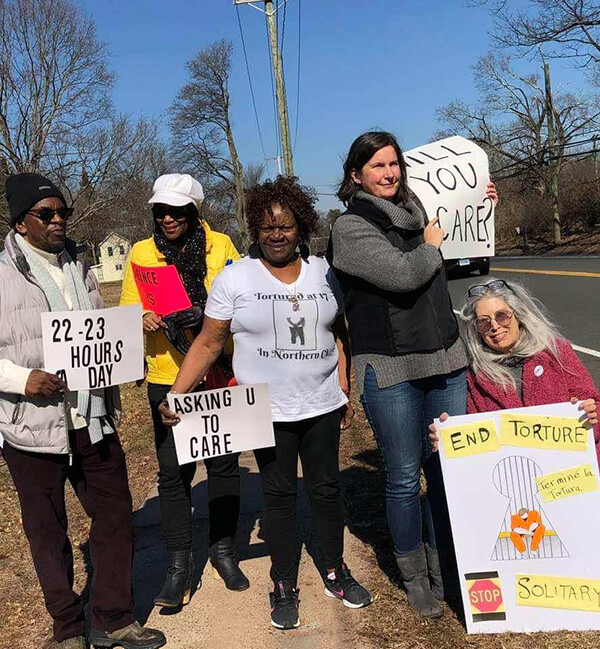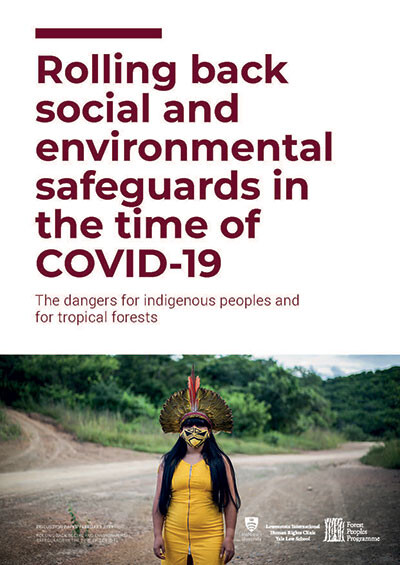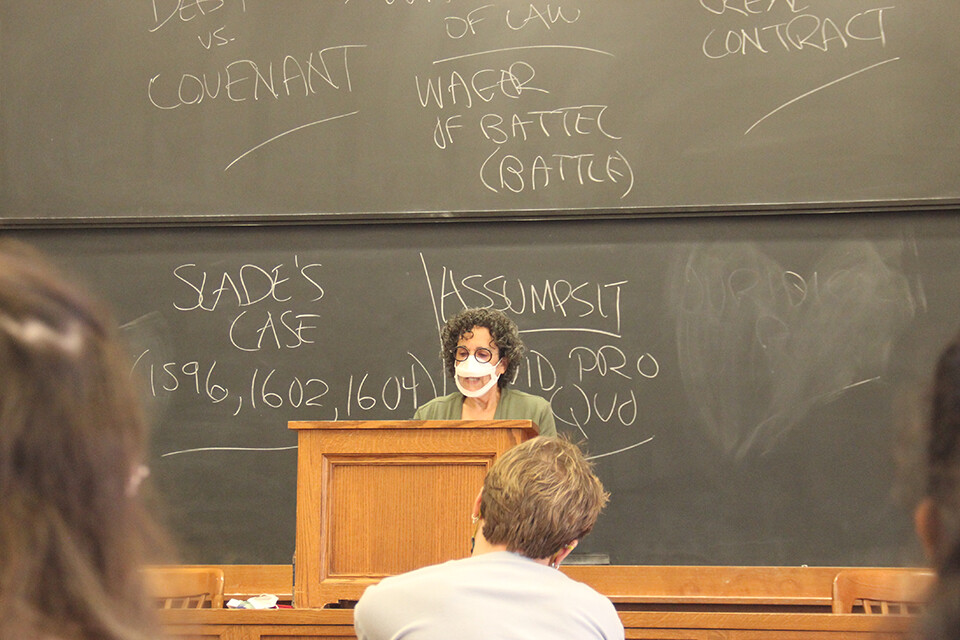Tackling Human Rights at Home and Across the Globe

Since 1989, the Orville H. Schell Center for International Human Rights4 has served as a hub for human rights activities at Yale Law School — and as a home for students preparing for human rights careers.
Its recent work has focused on fighting solitary confinement in Connecticut prisons as well as reporting on human rights abuses around the world. By engaging in these critical issues, The Schell Center and its Lowenstein Clinic are helping students discover how to use their legal training to create lasting, positive change that is making an impact in every corner of the globe.
On February 8, 2021, Connecticut Gov. Ned Lamont announced plans to close Northern Correctional Institution, citing consistent declines in the incarcerated population of the state’s only supermax prison.
The news came as a victory for organizations5 that had for years been critical of and worked to improve the conditions at Northern — among them, the Lowenstein International Human Rights Clinic6 at the Schell Center.
Since 2010, Lowenstein Clinic students have challenged the treatment of prisoners at Northern, and especially the use of prolonged solitary confinement, in a variety of ways. At different points, the clinic has represented individual clients at the prison, brought its investigative findings to the U.N. Special Rapporteur on Torture, supported legislative advocacy efforts, and sued the Department of Correction.
The diversity of tactics is typical of the Lowenstein Clinic and the Schell Center. Through the clinic, students have the opportunity to practice every mode of human rights advocacy. “I think that’s what we owe to our students,” said James J. Silk ’897, Director of the Schell Center and the Lowenstein Clinic. The opportunity to gain a broad set of skills helps students “understand the nature of human rights and human rights advocacy, and prepare to be a human rights advocate.”
“We are purposely generalists,” agreed Hope Metcalf8, the Schell Center’s Executive Director, who led the Lowenstein Clinic’s work on solitary confinement at Northern. The center does not limit itself to a particular geographic area, type of human rights abuse, or duration of project. Instead, its leaders seek out an array of opportunities for students to learn while making an impact.
“It’s important for students to be introduced to what it means to work with distant partners, often facing urgent and horrific violations, as well as those closer to home — what one scholar I respect calls ‘quotidian violations,’” said Silk.
“It’s important for students to be introduced to what it means to work with distant partners, often facing urgent and horrific violations, as well as those closer to home.”
—Professor James J. Silk
Northern, which sat just over an hour outside New Haven, was certainly close to home. And the alleged human rights violations taking place there, which included prolonged periods of isolation and in-cell shackling, warranted as much attention as any international issue. Indeed, in response to a 2019 letter from the Lowenstein Clinic outlining its findings on conditions at the prison, Nils Melzer, the U.N. Special Rapporteur on Torture, said several of Northern’s routine practices “may well amount to torture” and violate international law.
Metcalf ’s interest in prison reform began in the early 2000s, when she represented José Padilla, an American citizen who was declared an enemy combatant and allegedly tortured in military detention. Eventually, Padilla’s case was transferred to the U.S. criminal justice system; ultimately, he was found guilty and sent to the federal supermax prison in Colorado. There, Metcalf quickly discovered, “he was more or less subject to the same conditions, but it inspired zero public outrage.”
When Metcalf joined the Schell Center, she learned the ACLU of Connecticut was investigating abuses at Northern. She saw an opportunity to bring her experience — and the resources of the Lowenstein Clinic — to that effort.
Initially, Metcalf and her students focused on establishing the facts: how solitary confinement was being used, on whom, and for how long. But over time, a project that was originally intended to produce a report evolved into something larger.
“It was a fluid and multifaceted approach,” recalled Helen Vera ’13, who is now an attorney in the U.S. Department of Justice’s Civil Rights Division. In addition to working with clients, she and other students met with officials at the Connecticut Department of Correction. Those conversations produced some policy changes at the prison, but not everything they hoped to see.
The work was pedagogically and emotionally challenging, but, Vera said, “it’s one of the strongest and, in a way, happiest memories of law school — being with the group from the clinic, sitting around the table and working stuff out together.”

There was still plenty left to work out by the time Ify Chikezie ’22 joined the project in 2021. The Lowenstein Clinic was supporting Stop Solitary CT’s efforts to pass a prison reform bill, and, in partnership with Disability Rights Connecticut, preparing to sue the Department of Correction on behalf of prisoners with mental illness. “It was incredible to be able to pitch in to the project while so many of those pieces were at those junctures,” Chikezie said.
In fact, two landmark developments came just weeks after the semester ended: the official closure of Northern and Gov. Lamont’s unexpected veto of the prison reform bill.
To Metcalf, this combination of success and defeat offers a valuable lesson about human rights advocacy. “It’s been an emotional roller coaster,” Metcalf said. “But if you’re in this work, you need to appreciate how to seize the moments of success. And I am trying to remind my students that getting Northern to close was a big success.”
Chikezie pointed out that the lawsuit and Stop Solitary CT’s advocacy efforts continue. While she feels lucky to have been involved at a pivotal moment for the project, “that moment has not passed.”
Supporting Human Rights Around the World
The Lowenstein Clinic’s work on solitary confinement is one of many projects that offers law students hands-on experience with global human rights advocacy. In 2020, Chris Ewell ’22 worked with the U.K.-based Forest Peoples Programme to coordinate a report on threats to Indigenous rights around the world amid the pandemic9. The report found that governments in five countries (Brazil, Colombia, the Democratic Republic of Congo, Indonesia, and Peru) had pursued aggressive and environmentally destructive development projects in Indigenous territories — despite protections against such actions.

For Ewell, who hopes to pursue human rights law after graduation, the research showed just how easy it is to ignore social and environmental safeguards in the midst of a crisis. “Unless there’s a concerted advocacy campaign to ensure that something like Indigenous rights or forest protection is a priority… the easier option is always to capitulate to powerful interests,” he said.
The indifference of powerful interests to minority groups was also a takeaway of the clinic’s recent report on LGBT youth in South Korea10, which found that the government had done little to prevent widespread discrimination and bullying in schools.
Carolyn O’Connor ’19, who worked on the report in collaboration with a team at Human Rights Watch, has lasting memories of the project, including a visit to an LGBT youth counseling center in South Korea. It was “one of the most inspiring and welcoming places I have ever been in,” she recalled — but also clearly overtaxed due to the lack of adequate government support.
Now an attorney working on the U.S.–Mexico border, O’Connor is grateful for the experiences she had through the Lowenstein Clinic. “It gave me a toolkit to better understand the experiences of LGBT migrants and the way government institutions might be oppressing them, either through deliberate indifference to fundamental rights or blatant discrimination,” she said.
She’s also been following the response to the report and feels hopeful it will be useful to LGBT advocates in Korea. “I think the most gratifying thing is how the report is opening up new spaces in schools for dialogue about how to make both small and big changes.”
Beyond Clinical Work
Alongside the Lowenstein Clinic, the Schell Center offers several additional ways for law students to engage with human rights around the globe — even after they graduate. Two fellowships — the Robert L. Bernstein Fellowship in International Human Rights and the Robina Foundation International Human Rights Fellowship — fund around seven recent alumni per year as they pursue human rights advocacy. “It transforms their credentials, and it’s a foot in the door,” said Silk. The center offers Kirby Simon Summer Fellowships for current students as well.
The Human Rights Workshop11, which features guest speakers from many fields and backgrounds, introduces students to domestic and international human rights challenges. “We’re purposefully very catholic,” said Metcalf, welcoming scholars, journalists, and practitioners to speak.

For Chikezie, these events have offered a useful complement to clinical work, where it’s easy to develop “tunnel vision — you’re working for a client and doing the best you can for them,” she said. “The workshop was a great way to get more information on a broad array of issues, particularly ones I wasn’t covering as closely on my clinical project.”
Beyond its formal programs, the Schell Center offers a place for students interested in human rights to connect and find support — both from the center’s leaders and from each other. “I feel very close, emotionally, to the people I worked with,” Chikezie said.
That’s intentional, Metcalf said. Given the gravity of the issues addressed at the Schell Center, taking care of one another “is not just a nice thing to do. It’s a necessity.”
The bonds created at the Schell Center endure long after students leave Yale Law School. “Hope continues to be a really important mentor,” said Vera. “She’s always been really helpful to talk to about career moves.”
O’Connor, too, remains in touch with peers and mentors from the center. “It’s always easy to call and reach out about anything,” she said. “Jim and Hope just foster an incredible sense of community.”
By Susie Allen


